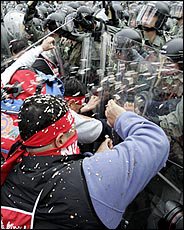

According to police estimates, 4500 protesters clashed with police today in the third biannual session of the Doha development round of the World Trade Organization talks (compared with the
organizers' estimate of roughly 10,000). (After 1999's infamous
Seattle meeting, the Doha round began in
Doha, Qatar, followed by a 2003 meeting in
Cancun and this year's meeting in
Hong Kong.) One hundred South Korean protesters
were reported to have "leapt into Hong Kong harbor"--Victoria Harbor near Wanchai--in protest, pictured above. (A map is available
here). A group of 200 nonviolent demonstrators is pepper foamed by
riot police, left.

European Trade Commissioner Peter Mandelson
wrote a lukewarm op/ed in today's
New York Times arguing that not only has "the European Union ... made significant concessions on agriculture on several occasions," but further that "Brazil, for example, should offer to reduce import tariffs on industrial goods." While it is easy for Mandelson to make sweeping generalizations about so-called "free" trade, he ignores all relevant data. In 2003 for example, Brazil imported four times from the US what the US imported from Brazil. In terms of Mandelson's own EU, Germany led the pack with a tenth of imports, followed by France's one-twentieth and Great Britain's one-fortieth. (All data from the WTO's own
International Trade Centre.) Before Mandelson criticizes Brazilian trade policy, he would be apt to focus on current EU intentions. Just today the French Trade Minister
told the New York Times, "The European Union will not make a new offer."

According to a
World Bank study of comparative world tariffs, exceedingly high US tariffs remain in all classified sectors, and the large majority of European countries maintain higher non-industrial tariffs (read: agricultural sector) than almost any developing country.
Even the
Washington Post's generally abominable Robert Samuelson
sees the light.


 According to police estimates, 4500 protesters clashed with police today in the third biannual session of the Doha development round of the World Trade Organization talks (compared with the
According to police estimates, 4500 protesters clashed with police today in the third biannual session of the Doha development round of the World Trade Organization talks (compared with the 




